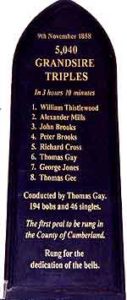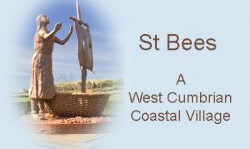History of Priory Bells
In 1855, the Priory’s single bell was cracked when being rung for the fall of Sebastopol in the Crimean War. This bell had been cast in 1815 and may have replaced the “iii parish bells” listed in the parish inventory of 1553 in the reign of Edward VI.
This engraving dates from 1840 and shows the Priory with its old tower which had to be considerably heightened to take the ring of eight bells.
This gave the impetus for the formation of a committee with the object of having a full ring of eight bells installed in the tower, and soon fund-raising was under way. By 1857 an order was placed with Charles and George Mears, of the Whitechapel bell foundry, for a ring of eight bells with a tenor of 13 cwt. The bells arrived in February 1858 by the recently constructed Furness Railway, but unfortunately, one of the prime movers in the scheme, Canon Parkinson himself, had died the previous month. His successor, Rev. G. H. Ainger, was faced with the immediate task of getting the bells into the tower. To make matters worse, it was found the tower would have to be made higher to accommodate the bells and their frame. The future of the scheme was in doubt until Ainger undertook to donate or raise the required £500 personally.
The money was promised, and work went ahead to the design of the famous architect William Butterfield, who gave the village a striking Romanesque spire. The bells were finally dedicated on the 9th November 1858.
The dedication day dawned with ringing of the bells at 8 a.m. At 9.30 a.m. a special train arrived from Whitehaven for those wishing to hear the new bells and attend the service of dedication. After the service the bells were rung until 4 o’clock, during which time a peal of 5,040 Grandsire Triples was rung in 3 hours and 10 minutes by a band of ringers from St. Nicholas, Pierhead, Liverpool. Later, the Liverpool ringers gave a hand bell concert to the 100 gentlemen who had taken lunch at the Royal Hotel, to which performance women were admitted!
Celebrations continued long after this, and almost got out of hand. The Whitehaven train was late leaving due to stray revellers and the ‘Cumberland Pacquet’ remarked; “It was not until the evening was far advanced that the village resumed its wonted quiet”.
Details of the first peal
5,040 GRANDSIRE TRIPLES in 3Hrs & 10 minutes
9th November 1858
Ringers
1 William Thistlewood
2 Alexander Mills
3 John Brooks
4 Peter Brooks
5 Richard Cross
6 Thomas Gay
7 George Jones
8 Thomas Gee
Conducted by Thomas Gay.
194 bobs and 46 singles.

